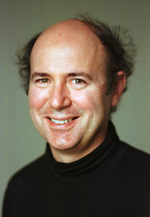Prominent Poles
Frank Wilczek, Polish-American physicist, Nobel Prize in Physics in 2004

Born: May 15, 1951, Mineola, New York, USA
Early days. Father Franciszek (Frank) is a retired electronics engineer, a Polish-American whose parents, Jan Wilczek and Franciszka Zybura, immigrated to the USA from Poland in 1920. His mother, Maria Cona is an Italian-American. Translated excerpts from an interview by Waldemar Piasecki for Polish magazine “Przeglad” (see a link at the bottom) cast some light on Professor Wilczek’s roots: “-You reportedly like mechanical toys. -–Yes I do and feel well in their company…-Isn’t this strange for a Nobel Prize winner? -–No, not in the Physics area. The physicists are free, sincere and open people, hard to confine in the bounds of propriety. Beginning with my countrywoman, Maria Curie-Sklodowska, till the present.-Since you said “countrywoman” asking for your Polish blood seems not to make sense.-- Wilczek is after all not an Anglo-Saxon or Spanish name. This is the name of my grandfather Jan. He was a soldier in General Haller’s Army and fought during WWI for Poland’s liberation…My grandmother Franciszka was a guardian of polishness. As much as she could she tried to convey this to her grandchildren mostly in the form of songs. From my mom’s side we had Italian influences. Hence I’m a mixed product, strongly rooted in European culture and tradition. I’m proud of it.”
Frank Wilczek went to a Public School 186 in Queens and then to Junior High 172. He got his high school diploma from Martin Van Buren High School in Queens.
Advanced education; teaching career. He received his Bachelor of Science in Mathematics at the University of Chicago in 1970, a Master of Arts in Mathematics at Princeton University, 1972, and a Ph.D. in Physics at Princeton University in 1974. He worked (1970-1980, 1990-2000) at the Institute for Advanced Study in Princeton, where he had a position of J. Robert Oppenheimer Professor in the School of Natural Sciences and in the Kavli Institute for Theoretical Physics in Santa Barbara. Frank Wilczek holds presently the Herman Feshbach Professorship of Physics at MIT.
Family. He married Betsy Devine on July 3, 1973; they have two daughters, Amity and Mira.
Research; Nobel Prize. In 1973, Wilczek, as a graduate student working with David Gross at Princeton University, discovered asymptotic freedom, which holds that the closer quarks (quarks are believed to be the most fundamental elemnets of matter) are to each other, the less the strong interaction (or color charge) between them; when quarks are in extreme proximity, the nuclear force between them is so weak that they behave almost as free particles. The theory--independently discovered by H. David Politzer--was important for the development of quantum chromodynamics.
Wilczek has helped to reveal and develop axions, anyons, asymptotic freedom, and other aspects of quantum field theory in general, and has researched condensed matter physics, astrophysics, and particle physics.
His current research includes:
• "pure" particle physics: connections between theoretical ideas and observable phenomena
• behavior of matter: ultra-high temperature, density, and phase structure
• application of particle physics to cosmology
• application of field theory techniques to condensed matter physics
• quantum theory of black holes
In early 2005, he appeared on an episode of Penn & Teller's Showtime skepticism program, Bullsh*t. The episode was about ghost hunters, and Dr. Wilczek was an expert used to refute paranormal pseudoscience.
Along with H. David Politzer and David Gross, he was awarded the 2004 Nobel Prize in Physics "for the discovery of asymptotic freedom in the theory of the strong interaction," to quote the citation by the Nobel Committee.
This article uses, among others, material from the Wikipedia article "Frank Wilczek" licensed under the GNU Free Documentation License. :
Frank Wilczek
Other sources include:
MIT
Betsy Devine’s (wife) blog
TYGODNIK PRZEGLĄD Interview with Wilczek in Polish weekly “Przeglad” (in Polish)
Honors and awards
Return to home page:
Prominent Poles
